I notice today that Wretchard at The Belmont Club has a post on refugees. It includes a lot of comments on survival skills. Basic requirements include guns and ammo so someone else doesn’t take your survival stores away from you. Water is important, as is water treatment supplies when you run out of stored water. The Mormons, as in so many other things, are the experts on survival skills. In the late 70s, the last time there was so much interest in survival methods, I had a Mormon office manager. She taught me a number of good facts about the way to survive a disaster. One is to have a supply of hard red wheat.
Our wheat comes in six-gallon buckets (or pails… another name for the same container.) The net (contents) weight of the grain is 45 lbs. for the conventional grain, and 40 lbs. for the organic grain. When you store grain at home, it needs to be protected in a couple of ways. First, it needs to be protected from a variety of little critters who’d like to get to it before you do. Weevils, for example. And isn’t this interesting: Chances are you’ve never seen weevils in the white bread or crackers you bought from the store. That’s because weevils put no stock in media campaigns from white-flour milling conglomerates; rather, they know what’s good for them, and they’d come after your grain from miles around if you let them. And mice have good nutritional judgment, too. Not that there’s ever been a mouse in your house, but if there was… you wouldn’t want it having access to your grain. Secondly, grain needs to be kept dry. The grain we sell is all dried to a very low moisture level that’s optimal for storage and baking and guarantees that you get the most grain for your money. You need to protect your grain from picking up excessive additional moisture, which can be drawn from the atmosphere. The buckets our grain comes in provide full protection against storage risks. They have airtight gasket-sealed lids, Mylar liners, and oxygen absorber packets that remove the oxygen from the air in the bucket after we put the lid on. The O2 absorbers leave an atmosphere of nitrogen in the bucket, because air consists almost entirely of oxygen and nitrogen. (The oxygen absorber packets themselves are completely food-safe, being made of powdered iron and salt, which are kept separate from the product itself.) Our buckets safely lock out pests, and biological processes are put “on hold” in the Mylar protected, oxygen-free nitrogen atmosphere, so your grain enjoys complete peace and quiet until you want to use it. Note: If you don’t already have a bucket lid removal tool, they make lid removal easy (see lower section of this Web page.) Super Pail packaging is the “gold standard,” the ultimate protection for your grain!
45 pounds of wheat may not be enough depending on the size of your family. The Mormons are encouraged to have a year’s supply stored.
Next you need a grain mill. It’s probably best, for survival purposes, to have this not electrical unless you have a generator available. If you are hard core, maybe the country living mill is for you. It would certainly give the kids something to do.
Hopefully, we won’t need a hand cart to transport our belongings.
In the 1970s, the last time I gave this much thought to survival skills, I was much younger and had a sailboat. The boat was stocked with some food and had room to store a lot more, especially freeze dried food. I used freeze dried as extra supplies on long races in case we had a dismasting or other disaster.
The boat I had in 1979 was a Yankee 38, a great cruising boat although a bit heavy for racing.
This is Bullet, the #1 hull of the Yankee 38 and almost identical to my boat.
My spinnakers were all red, white and blue. Otherwise this is identical to my boat. I took it to Mexico several times but not to Hawaii as it was too heavy and rolled badly in a heavy down wind run.
Here is the Choate 40 that I took to Hawaii in 1981 and which would have been a great escape boat in a disaster.
The interior was rather stark and did not have as much storage as the 38 but it had a huge interior volume and could store plenty of food and water. It had 100 gallons of water tankage.
Anyway, I can’t handle these boats anymore so that option is probably not there. I thought Lake Arrowhead would be a good hideout but I couldn’t tolerate the altitude so, in my decrepitude, I guess I will wait here with my hand gun for them to come get me.
Of course, Romney could still win the election.
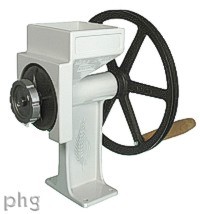
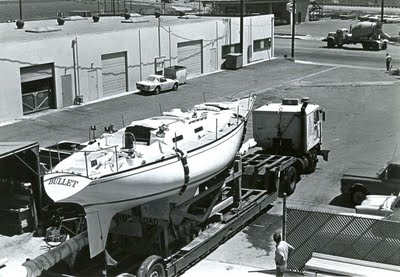
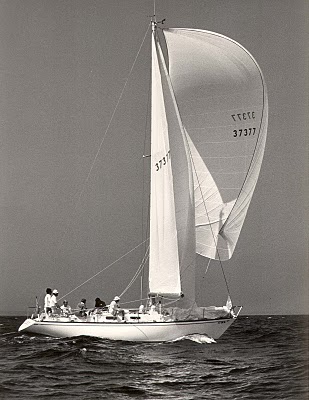
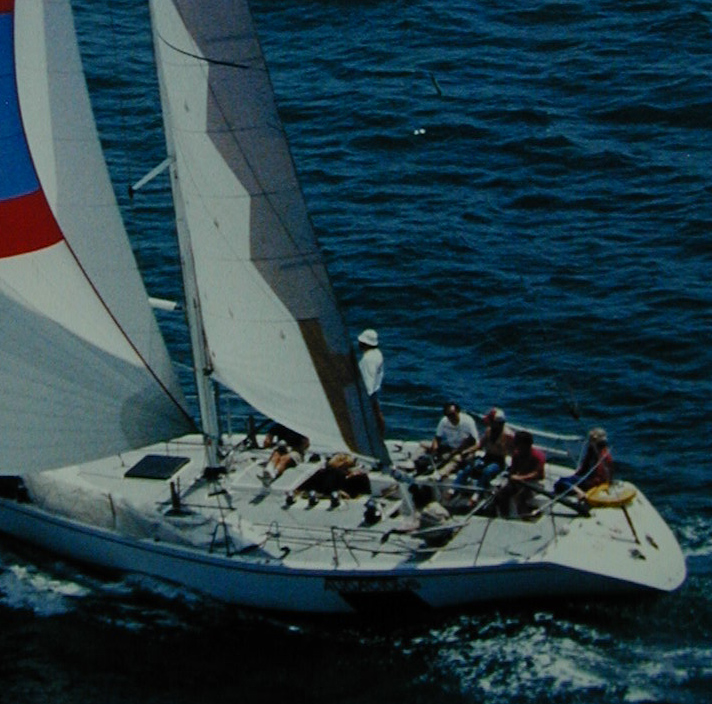
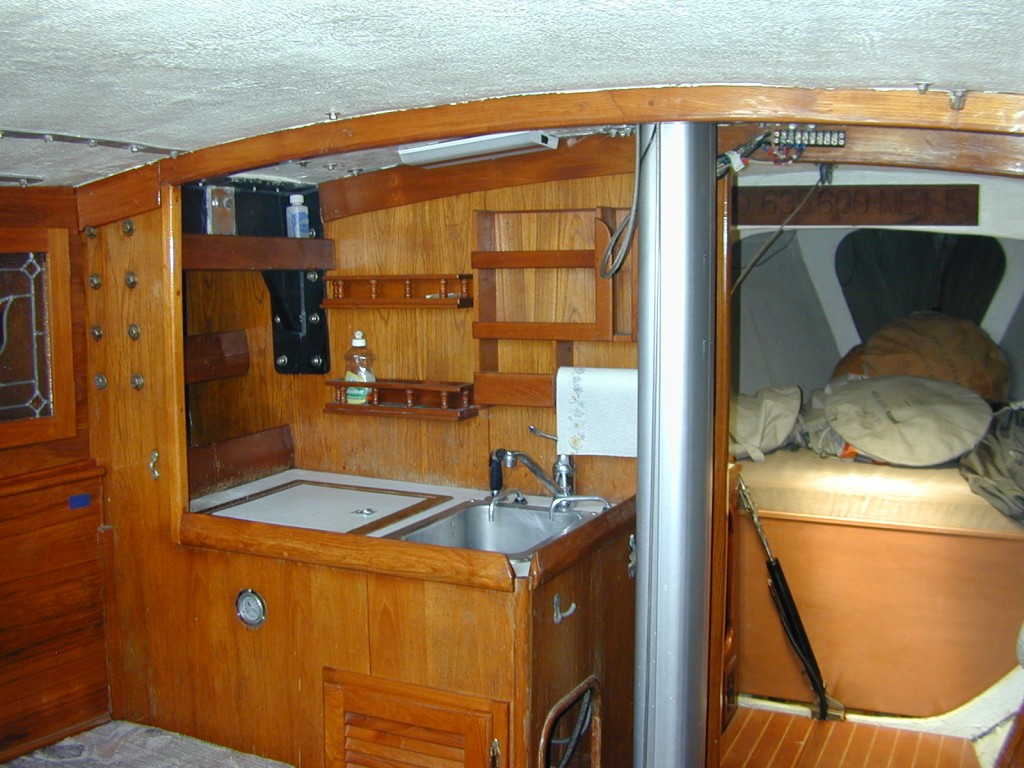
Ive been thinking lately of how a port city, or at least any sea side town that can harbor a boat is a little bit more immune to the despot or hoard than their inland sisters
“any sea side town that can harbor a boat is a little bit more immune to the despot or hoard than their inland sisters.”
There is always fleeing to the woods. Not as comfortable, though.
A friend who is an extraordinary programmer (as opposed to me being “average” – we were talking about the very real possibility of an EMP attack – everything with a semiconductor knocked out – most cars newer than 25 years old, banking systems – personally I’d rather sit out the apocalypse in a Yankee 38 (I guess fresh water would be the limiting factor) – than sit in a darkened house with my rifle.
Lake Arrowhead – all the Angelenos would be heading there.
If the Obamapocalypse happens I will be heading up to the Lake of the Woods. Lots of places to disappear and plenty of food to be “kilt” :)
http://en.wikipedia.org/wiki/Lake_of_the_Woods
“I guess fresh water would be the limiting factor)”
Most distance race boats have water makers aboard now. They are about $1500 and pretty reliable. Long races like Transpac used to require a of of water aboard, which is heavy. Now, not so much. In survival mode, I would definitely have a water maker.
“Lake Arrowhead – all the Angelenos would be heading there.”
That is a risk but they would have to find me. Anyway, it’s moot now. I feel much better at sea level again.
I plan on hiding out at the motor vehicle administration office. They’ll never find me.
Tony – that place sounds like Alaska, where a lot of people go to disappear. The problem in this scenario is getting there ;-)
Jonathan – you could do that now as it seems only half of Californians have a driver’s license ;-)
“any sea side town that can harbor a boat is a little bit more immune to the despot or hoard than their inland sisters.”
The motto of the State of West Virginia is Montani Semper Liberi (“Mountaineers are Always Free”). It has great deal of historic truth to it also. Besides, I can get there in a couple of hours, but I am a long way from the coast.
Ha ha I will die quickly in the center of Chicago. At least I will be able to look down on the mayhem from my balcony first.
I’m too tired to do this thought justice, but here goes…
Some kinds of survival situations do come on all at once, natural disasters in particular, and food, water, fuel, tools, weapons, are really good to have in those situations and can help you get through it, maybe even in comfort, until the status quo ante or something like it has returned.
Social and political disasters tend to happen slower, until suddenly they happen very fast indeed.
I can’t imagine the modern US going the route of sudden occupation or even sudden civil war. What seems more likely is the whole thing just running down more and more. The destruction of your home doesn’t happen by enemy artillery fire, it happens by your pay check and your time to do maintenance declining a little more year after year and your property taxes and other expenses going up, while inflation shrinks the dollar until you can’t afford it anymore, so you move to something smaller, shabbier, etc. The hordes don’t descend like packs of ravening zombies, they vote themselves a little more and a little more, they vandalize in the night, they drive up the price of your insurance and your security measures until your situation is financially untenable and you’re unable to create wealth.
I’m much more afraid of this second kind of disaster by erosion and find it much more difficult to plan for.
EDIT above, “I can’t imagine” is not true. Say “I find it far less likely.” I can imagine it all too easily.
Tony:
If the Obamapocalypse happens I will be heading up to the Lake of the Woods. Lots of places to disappear and plenty of food to be “kilt”
A friend’s father had seen Hiroshima within several months of the bomb being dropped on it. When he was discharged, he bought himself some hideaway land on Lake of the Woods, for a similar reason you are giving.
ringo Says on
July 11th, 2012 at 9:46 pm
…What seems more likely is the whole thing just running down more and more.
I suspect that there will be violent phases. Urban areas are dangerous. High concentrations of populations have high numbers of sociopaths. Sociopathy causes more damage the more of them there are in a small area, even if the percentage remains the same. Urban areas are largely what Bill Whittle calls Pink Tribe, and they are almost all Wolves and Sheepdogs. The Gray Tribe is overwhelmed, especially the Sheepdogs. [ see http://forthecognoscenti.com/2012/04/20/tribes-by-bill-whittle/ ]
Any such slow collapse will have a financial component. When the EBT cards no longer work, or the price of goods rises to the point where the EBT proceeds do not cover subsistence, or where the goods are not coming into urban stores; and things will get suddenly violent. I suspect that the time frame for that is far shorter than entropy winning. Further, any critical infrastructure failure [power, water, heat] and things get nasty right smartly.
Rural areas immediately around urban areas within several days march are at risk too.
Survival at sea, assuming that you have a secure area to go to, does sound ideal. Sadly, I have better than a mile between me and sea level.
Subotai Bahadur
CORRECTION to above:
“Urban areas are largely what Bill Whittle calls Pink Tribe, and they are almost all Wolves and Sheepdogs” should read “Urban areas are largely what Bill Whittle calls Pink Tribe, and they are almost all Wolves and Sheep.” Need more coffee.
Subotai Bahadur
I thought One Second After melodramatic. Perhaps not. New Orleans didn’t exactly disprove the apocalyptic vision.
“Survival at sea, assuming that you have a secure area to go to, does sound ideal.”
Neville Shute, who was a sailor, wrote a novel titled “Ordeal”, or in England “What happened to the Corbetts?” in 1938. It was about aerial bombing when it was still considered too awful to endure. The family finally escapes England in their sailboat. I have to read it again.
Ginny….for what its worth. A couple of months ago I was given One Second After to read by a friend of mine who is a high ranking active military officer, an MD and one who has been intimately involved in disaster preparedness on a national (and international) scale for some years. We had dinner last week and my reaction to the book was a topic of discussion. I told him that I thought the book somewhat overstated. He assured me that, in his professional opinion, it was not. He is a man that I trust, so that book instantly became that much more frightening than it already was.
Well, that’s a sunny thought Mike.
The trouble with an EMP is that it would probably kill the voltage regulator on the boat. Sails would still work but the water maker wouldn’t. Solar stills would still work. My car wouldn’t start, most likely, so it would be a trek to the boat.